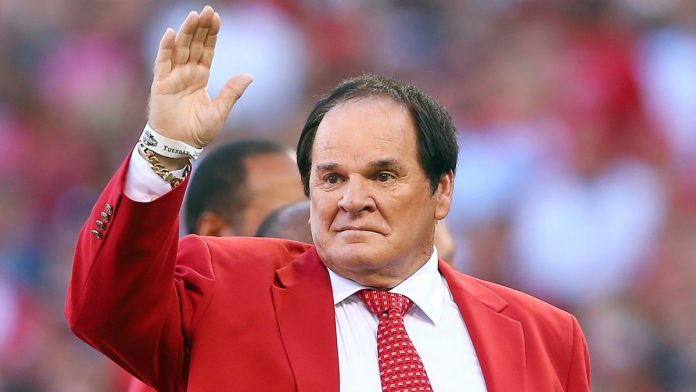CINCINNATI (AP) Pete Rose’s application for reinstatement was rejected Monday by baseball Commissioner Rob Manfred, who cited his continued gambling.
Rose agreed to a lifetime ban from baseball in August 1989 after an investigation for Major League Baseball by lawyer John Dowd concluded Rose placed numerous bets on the Reds to win while playing and managing the team from 1985-87.
Manfred said in a four-page decision the career hits leader admitted he has kept on betting on horse racing and professional sports, including baseball. He upheld the conclusions of the Dowd report and said MLB had obtained evidence not available to Dowd: a notebook of betting records in 1986 kept by Rose associate Michael Bertolini.
”In short, Mr. Rose has not presented credible evidence of a reconfigured life either by an honest acceptance by him of his wrongdoing, so clearly established in the Dowd Report, or by a rigorous, self-aware and sustained program of avoidance by him of all the circumstances that led to his permanent in eligibility in 1989,” Manfred wrote.
Manfred said Rose initially was not forthcoming about his current gambling.
”Even more troubling, in our interview, Rose initially denied betting on baseball currently and only later in the interview did he `clarify’ his response to admit such betting,” Manfred wrote.
Rose’s conduct violated Major League Rule 21, which calls for a lifetime ban for betting on any game ”with which the bettor has a duty to perform.”
”Allowing him to work in the game presents unacceptable risk of a future violation by him of Rule 21, and thus to the integrity of our sport,” Manfred wrote.
The ban prevents Rose from working for any major league team or minor league affiliate, but he is allowed to make ceremonial appearances with the commissioner’s permission and may work for third parties such as Fox, which hired Rose this year as a baseball analyst.
Players on the permanently ineligible list also may not appear on the Hall of Fame ballot, a decision taken by the Hall’s board in 1991.
At the time the ban agreement was announced, then-Commissioner A. Bartlett Giamatti said: ”The burden is entirely on Mr. Rose to reconfigure his life in a way he deems appropriate.”
Rose applied for reinstatement in September 1997 and met with Commissioner Bud Selig in November 2002, but Selig never ruled on Rose’s application. Manfred succeeded Selig in January, and Rose applied again on Feb. 26 to end the ban. He met with Manfred on Sept. 24.
Now 74, Rose repeatedly denied betting on baseball until in his 2004 autobiography, ”Pete Rose: My Prison Without Bars.” He reversed his stand and acknowledged he bet on the Reds while managing Cincinnati.
Rose submitted two reports to Manfred, one by Dr. Timothy Fong, co-director of the UCLA Gambling Studies Program and director of the UCLA Addiction Psychiatry Fellowship. Manfred said he gave the report little weight because it was inconsistent with what Manfred told him.
The second report was a polygraph test taken on Aug. 5 by a consultant retained by Rose’s representatives. Manfred wrote the polygraph test concluded ”no opinion” based on technical reasons that were not Rose’s responsibility.
A 17-time All-Star, Rose was the 1963 NL Rookie of the Year, 1973 MVP and 1975 World Series MVP. A three-time NL batting champion, he had 4,256 hits from 1963-86, topping the mark of 4,191 set by Ty Cobb from 1905-28.
Reds President Bob Castellini said he hopes the Hall will reconsider its decision preventing Rose from consideration.
”We and the fans think he deserves that opportunity,” he said.
—
AP Baseball Writer Ronald Blum in New York contributed to this report.
—
Follow Joe Kay on Twitter: http://twitter.com/apjoekay
25% Bonus via Western Union














